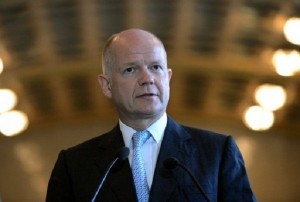Manila, Philippines – The British and Japanese governments welcomed the preliminary peace pact reached between the Philippine government and the Moro Islamic Liberation Front (MILF), saying that the deal was a huge step towards lasting regional peace and stability in Mindanao.
“This is a testament to the commitment and vision of the parties. The agreement has the potential finally to end the long-running conflict,” British Foreign Secretary William Hague said in a statement after President Benigno Aquino III announced Sunday the drafting of a framework agreement between the government and the MILF.
“Full implementation of the agreement by 2016 can bring about peace, security, and development. That will be good not only for Mindanao, but for the whole of the Philippines,” Hague said.
British ambassador to the Philippines Stephen Lillie underscored the importance of commitment to peace, citing as example his country’s experiences in negotiating a peace deal with Northern Ireland.
“We have shared many experiences from that process with the parties here. One of the most relevant lessons at this point is to recognize that even after an agreement, it won’t all be plain sailing, and there will still be challenges, Lillie said.
“But with commitment and hard work, these will be far outweighed by the benefits of peace, as our own experience since the Good Friday Agreement was signed 14 years ago shows,” the envoy added.
Japan also hailed the deal and recognized the efforts made by the Philippine government, the MILF, as well as the Malaysian government for its role as facilitator in the peace talks.
“Japan strongly hopes that both parties will steadily implement the contents of the Framework Agreement and continue their persistent negotiation efforts towards the early realization of the final agreement,” said a statement issued by the Japanese embassy.
Both governments also vowed to continue their support for the Mindanao peace process, noting the issue was an important point of discussion on the relations between the Philippines and their respective countries.
Both Japan and the UK are members of the International Contact Group (ICG) which monitors the developments in the peace talks.
“We have been showing our support since the ICG was formed in 2009, and we will continue to be supportive,” said Lillie.
Japan, in its statement, noted that it would continue with funding development projects to help develop Mindanao, particularly through sending of experts on development to the International Monitoring Team (IMT), economic cooperation projects such as extending Grassroots Grant Assistance for Human Security in former conflict-affected areas under the Japan-Bangsamoro Initiatives for Reconstruction and Development (J-BIRD), and continued participation in the ICG.
